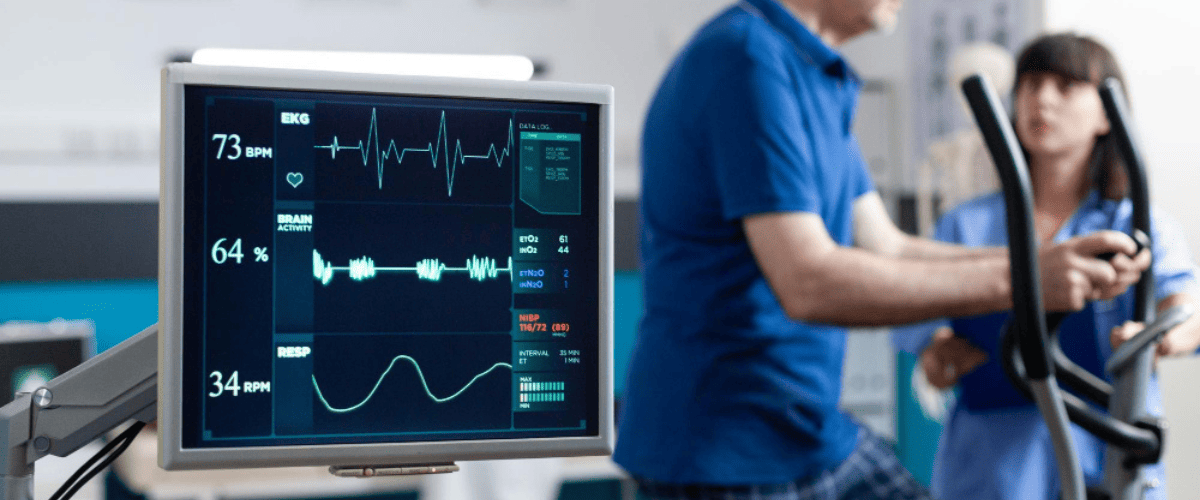
09 Jul How to Choose the Right ECG Test for Your Heart Health Needs
How to Choose the Right ECG Test for Your Heart Health Needs
By Island Hospital | July 9, 2025 10:10:00 AM
What if a simple, painless test could offer a profound glimpse into the very engine of your life – your heart? That rhythmic thump, thump, thump is your heart’s electrical orchestra, and sometimes, even the slightest off-note can signal a concern.
Here’s where an electrocardiogram (ECG) helps us with its quick, non-invasive “diagnostic check” of your heart’s electrical system and offering vital insights into its health.
Yet, just like there are different ways to inspect a city’s power lines, there are various types of ECGs, each designed for specific questions.
Don’t worry if you feel lost in the options because our guide is here to help you understand which one best suits your situation, and prepare you for your experience, particularly when considering the expertise at Island Hospital for your cardiac well-being.
Who Needs an ECG Test?
An ECG is often recommended if you experience symptoms that could indicate a heart condition or if you have certain risk factors.
You might need an ECG if you have the following symptoms or tick off certain risk factors associated with heart diseases:
Symptoms
- Palpitations: A feeling of a racing, pounding, or fluttering heart.
- Chest pain: Especially if it’s new, recurring, or accompanied by other symptoms like shortness of breath.
- Shortness of breath: Unexplained breathlessness, particularly during exertion.
- Dizziness or lightheadedness: Especially if it leads to fainting.
- Fatigue: Persistent and unexplained tiredness.
Risk Factors/Situations
- Family history of heart disease: Especially if it occurred at a young age.
- High blood pressure (hypertension): To monitor its impact on the heart.
- High cholesterol: To assess overall cardiovascular health.
- Diabetes: As diabetes can increase the risk of heart disease.
- Before surgery: To assess heart function and ensure you’re fit for the procedure.
- Monitoring existing heart conditions: Such as arrhythmias or after a heart attack.
Types of ECG Tests
There are various ECG tests you can carry out and finding the best fit to test your heart condition is important to rule out any uncertainties.
It helps you to understand the different types of ECGs better and can help you and your doctor determine the most appropriate test for your situation. Here’s a breakdown of the following:
1. Resting ECG
The resting ECG test (also known as a resting electrocardiogram), is one of the most common ECG tests that is non-invasive where it records the electrical activity of your heart while you are at rest.
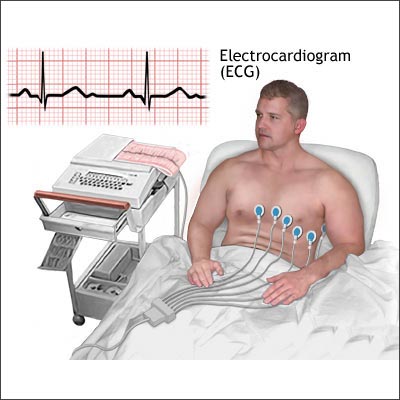
The device allows doctors to assess your heart’s rhythm, rate, and overall electrical activity while at rest. These electrical signals can detect abnormalities in heart rhythm (arrhythmias), signs of previous heart attacks, or issues with heart muscle or valves that you may have.
The test involves attaching electrodes to your chest, arms, and legs, and then lying down while the machine records your heart’s signals.
2. Holter Monitor (Ambulatory ECG)
In comparison to the resting ECG, a Holter monitor or ambulatory ECG is a portable device that continuously records your heart’s electrical activity even as you go about your daily activities.
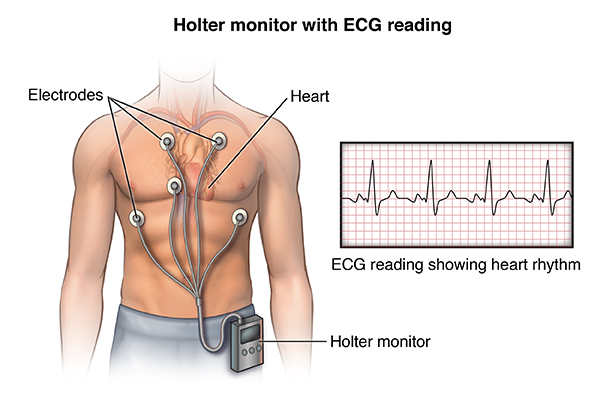
This portable device is worn for 24 to 48 hours (or sometimes longer) and is particularly useful for detecting intermittent arrhythmias that might not show up during a brief resting ECG.
3. Stress ECG (Exercise ECG or Treadmill Test)
When a normal healthy person exercises, their heart pumps blood more vigorously to supply muscles, similar to how blood flow is monitored during a cardiac stress test.
This test highlights how your body’s cardiovascular response to exertion can provide insights into the heart’s activity while you exercise on a treadmill or stationary bicycle.
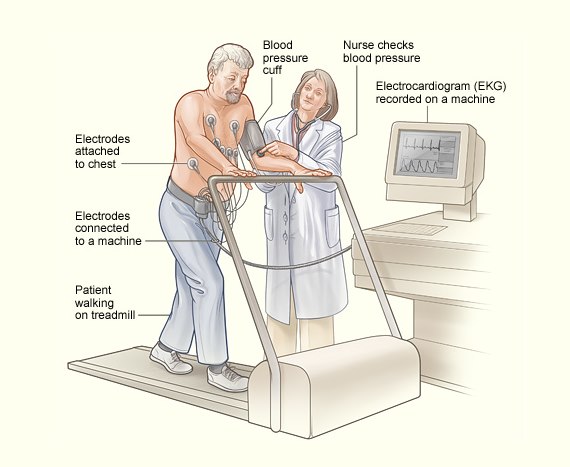
Melbourne Cardiovascular & Diabetes Centre
It is done to assess how your heart performs under stress and can detect blockages in the coronary arteries that might not be apparent at rest. Find more information on this test in our blog on Stress Tests in Malaysia: What to Expect.
Here’s a table to guide you on which ECG type might be recommended based on your symptoms or conditions:
| Symptoms / Conditions | Recommended ECG Type(s) |
|---|---|
| Persistent palpitations | Resting ECG, Holter Monitor |
| Intermittent dizziness / Fainting | Holter Monitor |
| Suspected Coronary Artery Disease (CAD) | Stress ECG, Resting ECG |
| Chest pain at rest | Resting ECG |
| Chest pain during exertion | Stress ECG |
| Irregular heartbeat (constant) | Resting ECG |
| Monitoring medication effectiveness | Resting ECG, Holter Monitor |
| Family history of heart disease | Resting ECG (as part of a general check-up) |
Heart racing but not out of love can signal an underlying cardiac issue! Understand the significance of heart screening and how it is crucial in maintaining a healthy heart here.
How Should I Prepare for an ECG?
Proper preparation for any procedure, medical or otherwise, is crucial for accurate results and a smoother experience.
Unlike many other medical procedures that may require dietary restrictions, medication adjustments, or rigorous mental preparation, ECG tests are far less worrisome as there’s generally nothing special you need to do to prepare.
There are only a few steps you need to do:
- Avoid applying skin products: Lotions, oils, or powders on your chest on the day of the test as it can interfere with the electrode adhesion.
- Avoid heavy meals and caffeine: They can affect heart rate and rhythm, especially for a stress ECG.
- Avoid smoking: It is highly recommended to avoid smoking before the test as nicotine can temporarily alter heart rate.
- Inform your doctor about medications: Certain medications can affect heart rhythm, so it’s important that your doctor be aware of all that you’re taking (including herbs and supplements).
- Stay hydrated: But avoid excessive caffeine intake if you’re having a stress test.
- Wear comfortable clothing: A top that’s easy to remove or adjust is ideal, as electrodes will be placed on your chest, arms, and legs.To ensure the most accurate readings, it’s generally recommended that women remove their bra for a resting ECG, especially so electrodes can be properly placed on the chest.
Please know that your healthcare provider will guide you through the process and help you feel as comfortable as possible.
Is ECG a Painful Procedure?
Rest assured that an ECG is a simple, non-invasive, and radiation-free procedure that is generally not painful. You won’t feel any electrical currents being sent into your body during the test.
The most you might feel is a slight tug when the electrodes are removed, but this is minimal, similar to taking off a bandage, and occasionally, a mild, temporary skin irritation where the electrodes were placed.
When it comes to risks and complications, ECGs carry minimal and rare concerns. Since it’s a non-invasive test, there’s no cutting of the skin or insertion of instruments into the body.
The primary “risks” are generally limited to minor skin irritation from the adhesive pads or, in very rare cases with exercise stress ECGs, the exertion could potentially trigger symptoms in individuals with underlying heart conditions (which is precisely why these tests are monitored closely by medical professionals).
Overall, an ECG is a very safe and routine diagnostic tool.
What are the Steps for the ECG Procedure?
The ECG procedure is generally straightforward, though it varies slightly depending on the type of test your doctor recommends.
1. Resting ECG
This quick, non-invasive test typically takes only a few minutes. You’ll lie comfortably while a technician attaches small, sticky electrodes to your chest, arms, and legs.
These electrodes are connected to an ECG machine that records your heart’s electrical signals. You’ll be asked to lie still and breathe normally during the brief recording.
For females, the procedure is essentially the same, with a focus on ensuring comfort and privacy during electrode placement by a female nurse or technician. Afterward, the electrodes are removed, and you can immediately resume normal activities.
2. Holter Monitor (Ambulatory ECG)
If your symptoms are intermittent, a Holter monitor might be used. This involves wearing a small, portable ECG device, often for 24 to 48 hours (or longer). Electrodes are attached to your chest and connected to the monitor, which you wear discreetly under your clothes while going about your daily activities.
You’ll typically be asked to keep a diary of your activities and any symptoms you experience, as this helps correlate heart activity with your everyday life. You’ll return the monitor after the monitoring period.
3. Stress Test
Electrodes are placed on your chest, and your heart rate, blood pressure, and ECG are monitored while you walk on a treadmill or cycle a stationary bike.
The intensity gradually increases to see how your heart responds to stress. If you’re unable to exercise, medication can be given to simulate the effects of exertion on your heart. This test provides valuable information about your heart’s performance during activity.
Struggling with simple tasks like climbing stairs? It could be a heart attack. Learn the warning signs and crucial next steps in our article, “Heart Attack Warning Signs: How to Spot Them Early.“
Understanding your ECG results
The results of your ECG are interpreted by a cardiologist, a doctor specialising in heart conditions.
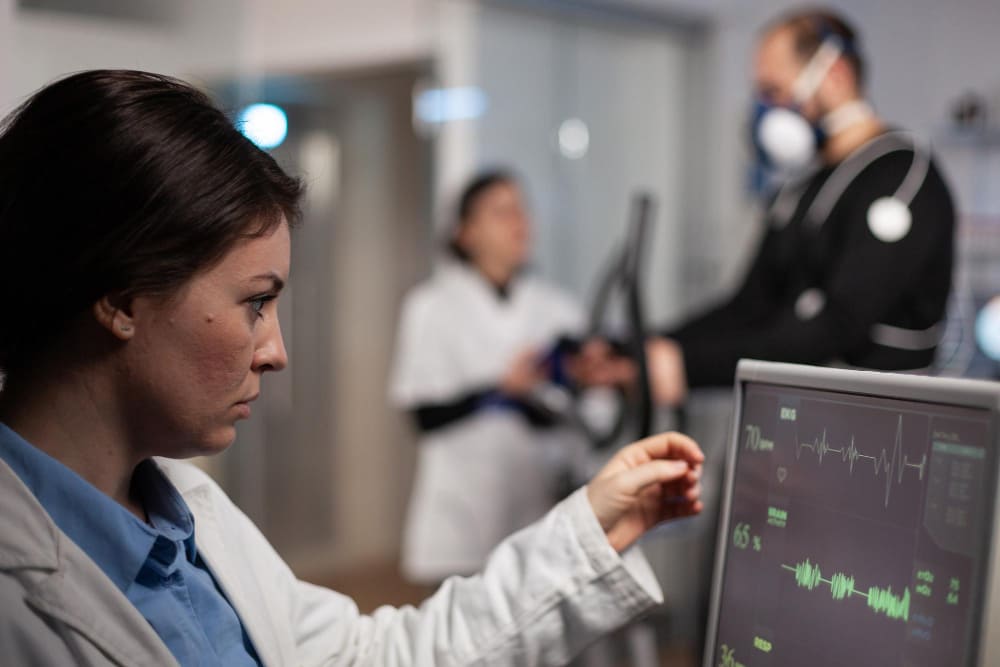
1. What do the results mean?
The ECG tracing shows waves and spikes that represent the different phases of your heartbeat. The cardiologist will analyse these patterns for:
- Heart Rate: How fast or slow your heart is beating.
- Heart Rhythm: Whether your heartbeat is regular or irregular (arrhythmias).
- Electrical Axis: The overall direction of electrical activity in the heart.
- Evidence of Heart Attack: Signs of past or ongoing heart damage.
- Enlargement of Heart Chambers: Indications of thickened or enlarged heart muscle.
2. Normal and abnormal results, next steps:
- Normal Results: A normal ECG generally indicates that your heart’s electrical activity is functioning well at the time of the test. However, it’s important to remember that an ECG is a snapshot in time and may not detect all heart conditions, especially intermittent ones. Your doctor will discuss the results with you and determine if any further investigations are needed based on your symptoms and risk factors.Our blog on 11 Common Heart Check-Up Myths Debunked With Cardiologist, Dr Lee Tjen Jhung might offer further insights.
- Abnormal Results: If your ECG results are abnormal, it means your heart’s electrical activity shows deviations from the normal pattern. This could indicate various conditions, such as:
- Arrhythmias (irregular heartbeats)
- Coronary artery disease
- Heart attack (past or current)
- Heart muscle problems
- Electrolyte imbalances
Your cardiologist will explain the specific abnormalities found and recommend the next steps, which may include further tests (like an echocardiogram, stress test, or blood tests), medication, or lifestyle changes.
3. When will I know the test results?
At Island Hospital, our commitment to efficient patient care means you’ll typically receive your ECG results quickly, often on the same day as your test.
Our cardiologists are readily available to interpret your results and discuss them with you, ensuring you receive timely and comprehensive feedback.
Although for more complex studies like a Holter monitor or stress test, the comprehensive analysis might take a little longer, our dedicated team of cardiologists are readily available to interpret your results as soon as they are ready.
They will then discuss them with you in detail, ensuring you receive timely, clear, and comprehensive feedback.
Listen To Your Heart
If your heart races even when you’re not looking at your loved one, it could signal an underlying cardiac issue!
Island Hospital understands the importance of your heart health and we’re here to provide exceptional cardiac care for your heart health.
Our Cardiology unit is equipped with state-of-the-art technology and is highly committed to providing exceptional cardiac care, offering a comprehensive range of diagnostic, interventional, and preventive cardiac treatments to keep your heart healthy.
For those seeking comprehensive cardiac assessment, consider our Comprehensive Cardiac Arrhythmia Screening package. This package typically includes:
- Resting ECG, Stress Test, Echocardiogram, Blood (Profile-D) + Urine (Profile D)
- Holter Study
- Consultation by Electrophysiologist
(consultation and reporting) - Blood tests (e.g., cholesterol, blood sugar)
Book Your Appointment with Island Hospital Today.
FAQ
Can an ECG detect heart blockage?
An ECG can show signs that suggest a heart blockage, such as changes in the electrical activity of the heart muscle due to insufficient blood flow.
However, it cannot directly visualise a blockage. If a blockage is suspected, further tests like a stress ECG or coronary angiogram would be needed for a definitive diagnosis.
Is my heart okay if my ECG results are normal?
A normal ECG is a good indicator of current heart health. However, as mentioned, it’s a snapshot and does not dictate your final results and overall heart health.
If you continue to experience symptoms, your doctor might recommend additional tests or monitoring (like a Holter monitor) to rule out intermittent issues.
It is always important to discuss your concerns thoroughly with your doctor.
Can I eat before doing ECG?
For a standard resting ECG, you can generally eat before the test. However, it’s advisable to avoid a heavy meal right before, as it can sometimes cause discomfort or slight changes in heart rate.
For a stress ECG, you will typically be advised to avoid eating or drinking anything other than water for a few hours before the test. Always follow your doctor’s specific instructions.
Can nervousness affect an ECG?
Yes, nervousness and anxiety can affect an ECG as stress hormones can increase your heart rate and sometimes cause irregular heartbeats, which might be picked up on the ECG.
How to stay calm during an ECG?
To maintain accuracy in your ECG results, here’s what you can do:
- Inform the technician if you feel nervous.
- Practice deep breathing exercises.
- Focus on relaxing your muscles.
- Remember that the procedure is quick, non-invasive, and painless.






